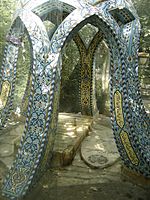About Rahi Mo'ayyeri
- Rahi Mo'ayyeri ( ??? ????? in Persian) (April 30, 1909 – November 15, 1968).
- True name: Mohammad Hasan Mo'ayyeri (???? ??? ????? in Persian).
- Iranian poet and musician. He was born into an artistic and musical family on April 30, 1909 in Tehran.
- His uncle was the famous Qajar Era poet Foroughi Bastami.
- He began to write poetry when he was seventeen years old and chose Rahi as his pen name.
- He showed talent from an early age and wrote the famous "Shod Khazan" at the age of 12-13.
- Rahi studied the works of all the great masters of Persian literature, but was especially fond of Saadi, whose influence is readily visible in his poetry.
- In addition to qazals, he also wrote some masnavis. Rahi was a composer as well as a poet.
- His poetry combines beautiful imagery, eloquence, and delicacy of expression.
- These qualities and his deep understanding of Persian music made him the poet of choice for many Iranian composers of his time.
- Rouhollah Khaleghi and Rahi met in 1941, and from this point on, Rahi wrote the lyrics for most of Khaleghi’s compositions as well as those of Morteza Mahjoubi, Ali Tajvidi, Hossein Yahaqqi, Moussa Maroufi, and Javad Maroufi.
- Rouhollah Khaleghi said that he was especially impressed with Rahi’s ability to fit words to music.
- Rahi’s poems have been published in Saye-ye Omr Sayeh Omr (???? ??? in Persian) (translated "The Shadow of Life") (1964), Azadeh (1974), and Javdaneh Rahi (1984).
- Rahi had a deep friendship with Mr.
- Davood Pirnia (the founder of Golha Program) and due to that friendship he did a lot of work with Morteza khan Mahjoubi in the Golha Programs.
- Some believe that the late 1950s and 1960s were the golden age of Persian music.
- After the resignation of Mr.
- Pirnia, Rahi agreed to run the Golha Program and continued to do so up until his illness.
- He was known as a very well dressed man with stunning green eyes.
- He never married.
- The former Shah's mother and the Shah were fans of Rahi Mo'ayyeri's work and because of that he was influential in the Pahlavi regime.
- He was a very selfless man and did not even want to publish his book.
- He always said that his poems will not compare to the old masters.
- He also wrote many comic poems under many pen names.
- One of his last works was Golhayeh Rangarang #470 that was sung by Haydeh with music by Master Tajvidi (Some claim that this is the song that made Haydeh famous). In style, according to Iraj Bashiri, Mo'ayyeri is influenced by Sa'di.
- Bashiri also thinks Helali, Forughi Bastami, and Mu'tamid al-Daula Nishat served as models of simplicity in diction for him.
- "The Noose of Fate" and "Restive Flowers" are very good representatives of Mo'ayyeri's maturity in theme and simplicity.His book Sayeh Omr (???? ??? in Persian) (translated "The Shadow of Life") of poems was printed in 1964. He died on November 15, 1968 in Tehran.
- The shah of Iran and his entire court attended the funeral services at the Sepasalar Mosque.
- He is buried in the Zahir o-dowleh cemetery in the northern parts of Tehran. He was the son of Mohammad Hassan Khan Mo'ayeri.
Read more at Wikipedia


 Date of Birth:
Date of Birth:  Place of Birth: Tehran, Tehran Province, Iran
Place of Birth: Tehran, Tehran Province, Iran